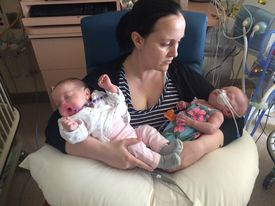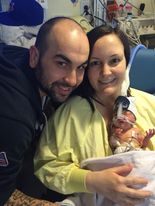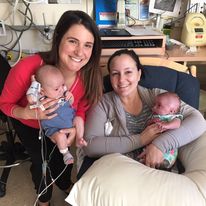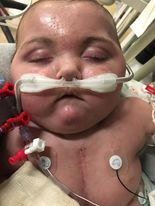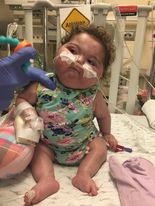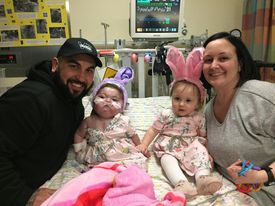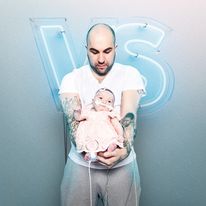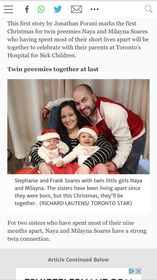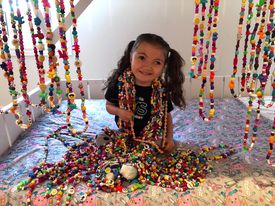connected beyond the beads
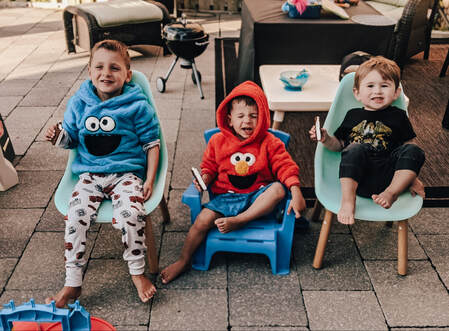 Theo • Christian • Adam
Theo • Christian • Adam
••• Welcome to the Beyond the Beads community where you can connect to other Mamas, families, friends, & caregivers.
Here you will find stories & journeys shared by other people who have gone through similar experiences.
It doesn't matter if you had a complicated pregnancy, traumatic birth story, a NICU stay for a day or even a year+, an Emergency Room visit, or a long-term hospital stay. This is NOT about comparing stays, experiences, trauma, or conditions - we've all been through struggles, & everyone's experience is valid & deserves to be heard. We are here to support, avoid judgement, & recognize the emotions of each person's journey.
If you'd like to contribute your story, please click the link & complete the document with as much information as you feel comfortable sharing.
You can email your response to [email protected]
Thank you for sharing your story!
•••k
Here you will find stories & journeys shared by other people who have gone through similar experiences.
It doesn't matter if you had a complicated pregnancy, traumatic birth story, a NICU stay for a day or even a year+, an Emergency Room visit, or a long-term hospital stay. This is NOT about comparing stays, experiences, trauma, or conditions - we've all been through struggles, & everyone's experience is valid & deserves to be heard. We are here to support, avoid judgement, & recognize the emotions of each person's journey.
If you'd like to contribute your story, please click the link & complete the document with as much information as you feel comfortable sharing.
You can email your response to [email protected]
Thank you for sharing your story!
•••k
| community_form.docx |
Elyse's STORY BY mama adelle
•••Mcmaster children's hospital - hamiliton, ON
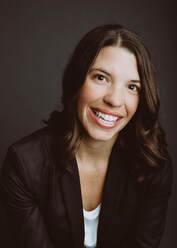
Dear New Parent Whose Baby is Hospitalized:
You are not alone. And if you’re reading this, you’ve come to a good place.
Two wonderful moms, Jess and Kayla, have created a space, Beyond the Beads, for families to share their hospital experiences and to come together and support one another. They asked me to share my family’s story by answering a few questions posted in a word document on their site. I used the questions as a guide, but the idea of the form itself prompted memories of my hospital experience.
Forms. In the hospital, there were plenty of them. After my twenty-week ultrasound, which showed a soft-marker, or indication, for Down syndrome, I sat in the genetics clinic at McMaster Children’s Hospital filling out the same form for the second time that day with my family’s medical history. With my husband Dan by my side, we waited for the results of my ultrasound and bloodwork. The high-risk obstetrician arrived, test results in hand: positive.
Then, in the NICU, after Elyse was born, I was handed a from with a checkbox and the word disabled. I wondered: aren’t all newborns disabled and dependent on their mothers?
When a fetus is diagnosed with a chromosomal difference doctors consult their own forms and checklists. In the case of Down syndrome, the two most common health concerns involve the heart and the gastro-intestinal system.
Elyse was born with duodenal atresia—an atresia meaning a blockage in the duodenum—a section of the small intestine. She would die without surgery, no food able to pass through. I’m thankful we knew about the need for immediate surgery beforehand because I’m a mom who likes to prepare. I read what I could, but ultimately, nothing can fully prepare you for your child’s hospital experience. It’s just something you have to get through.
Our eldest daughter Ariel was 18 months old when Elyse was born. The forms to fill out were minimal with her birth; she was a textbook baby, mine a textbook pregnancy. The contrast between my first and second pregnancy experiences was one of the most difficult aspects of our hospital stay. I had to push away surreal thoughts of this shouldn’t be happening and embrace the idea of this is happening and you will get through it.
Elyse underwent surgery to fix the atresia at one day old. Dan says waiting for the surgery to be done, and knowing our baby was okay was one of the hardest parts for him, as well as the days of her being in critical condition that followed.
We made the best of our hospital experience, and I encourage other parents in our situation to do the same thing. Take mini breaks. We were fortunate to have family and friends babysit Ariel so Dan and I could visit the hospital together in the evenings when he was off work. After singing to Elyse in the NICU and reading her stories, we’d head down to the café on the main floor and grab a hot chocolate. I cherished those brief reprieves. And somehow, miraculously, we’d find ourselves laughing between tears, enjoying each other’s company, and I’d think who else that has a newborn and a toddler at home gets to do this? We made the best of a difficult situation as a coping mechanism for survival. In many ways, I found myself completely cut off from the outside world. What mattered for those four and a half weeks was to check off the doctor’s boxes: get through surgery, intubation and heavy sedation, ditch the NG tube, build the strength for one breastfeed, then two, until Elyse could successfully breastfeed eight times in a day and we could bring our baby home.
Another difficult stage was right before the finish line. Dan recalls when Elyse was moved from the NICU to the “ICU lite” as he called it, also known as the PICU (Paediatric Intensive Care Unit).
“I was like, okay, well can’t she just go home then?” he said. From my end, one day I showed up in the morning for my daily vigilance over my baby and she was gone. The team moved her to the PICU overnight without telling me. I quelled panic, and in the end, the news was good, our baby was getting stronger, closer to home, but the scenario brings up an important point. Good communication. We were greatly comforted by the physicians’ plans. We felt like our baby’s life was in good hands because the team at Mac took the time to explain what was going on (notwithstanding the occasional blip or two). As the parent, make sure you’re included as part of the team. You establish this relationship by showing interest, asking questions, and being involved as much as possible with your child’s care.
Before we were in the hospital, I talked to another mom whose son had been through heart surgery.
“During that time,” she said, “you will be a mess.”
It’s going to be tough. Things are going to be hard.
“But now,” she said, “those days feel far behind us. I almost forget they ever happened, and one day—I know it’s hard to image now—but it will feel that way for you too.”
Elyse is eight years old now and, in our case, these words ring true. Life goes on. Acknowledge that what you are going through is hard. And know that it will pass.
Our hospital experience was part of our journey as parents, and we’re forever grateful to the professionals who saved our daughter’s life, and in a way, saved ours too.
Elyse has been back to the hospital for follow-up appointments, a few minor surgeries, but we continue to approach her life as we did those days in the hospital: with joy and one step at a time. And with love. When we sang to Elyse or read her stories in the NICU, the nurses in the room would lean in because they could feel our love and they wanted to be a part of it. I believe, above all, that love healed our daughter. Please, if your baby isn’t doing well, or they take a turn for the worst, know that isn’t your fault either and not because you don’t love them enough. If you’re even thinking like that then I know you do carry an abundance of love inside of you. Sadly, sometimes no amount of love can make a sick baby better and I see those parents; I’m sending you all the care and love in the world.
Our love for each other and our baby got us through our time in the hospital and there is no form for that, just a whole lot of feeling the way with your heart.
You are not alone. And if you’re reading this, you’ve come to a good place.
Two wonderful moms, Jess and Kayla, have created a space, Beyond the Beads, for families to share their hospital experiences and to come together and support one another. They asked me to share my family’s story by answering a few questions posted in a word document on their site. I used the questions as a guide, but the idea of the form itself prompted memories of my hospital experience.
Forms. In the hospital, there were plenty of them. After my twenty-week ultrasound, which showed a soft-marker, or indication, for Down syndrome, I sat in the genetics clinic at McMaster Children’s Hospital filling out the same form for the second time that day with my family’s medical history. With my husband Dan by my side, we waited for the results of my ultrasound and bloodwork. The high-risk obstetrician arrived, test results in hand: positive.
Then, in the NICU, after Elyse was born, I was handed a from with a checkbox and the word disabled. I wondered: aren’t all newborns disabled and dependent on their mothers?
When a fetus is diagnosed with a chromosomal difference doctors consult their own forms and checklists. In the case of Down syndrome, the two most common health concerns involve the heart and the gastro-intestinal system.
Elyse was born with duodenal atresia—an atresia meaning a blockage in the duodenum—a section of the small intestine. She would die without surgery, no food able to pass through. I’m thankful we knew about the need for immediate surgery beforehand because I’m a mom who likes to prepare. I read what I could, but ultimately, nothing can fully prepare you for your child’s hospital experience. It’s just something you have to get through.
Our eldest daughter Ariel was 18 months old when Elyse was born. The forms to fill out were minimal with her birth; she was a textbook baby, mine a textbook pregnancy. The contrast between my first and second pregnancy experiences was one of the most difficult aspects of our hospital stay. I had to push away surreal thoughts of this shouldn’t be happening and embrace the idea of this is happening and you will get through it.
Elyse underwent surgery to fix the atresia at one day old. Dan says waiting for the surgery to be done, and knowing our baby was okay was one of the hardest parts for him, as well as the days of her being in critical condition that followed.
We made the best of our hospital experience, and I encourage other parents in our situation to do the same thing. Take mini breaks. We were fortunate to have family and friends babysit Ariel so Dan and I could visit the hospital together in the evenings when he was off work. After singing to Elyse in the NICU and reading her stories, we’d head down to the café on the main floor and grab a hot chocolate. I cherished those brief reprieves. And somehow, miraculously, we’d find ourselves laughing between tears, enjoying each other’s company, and I’d think who else that has a newborn and a toddler at home gets to do this? We made the best of a difficult situation as a coping mechanism for survival. In many ways, I found myself completely cut off from the outside world. What mattered for those four and a half weeks was to check off the doctor’s boxes: get through surgery, intubation and heavy sedation, ditch the NG tube, build the strength for one breastfeed, then two, until Elyse could successfully breastfeed eight times in a day and we could bring our baby home.
Another difficult stage was right before the finish line. Dan recalls when Elyse was moved from the NICU to the “ICU lite” as he called it, also known as the PICU (Paediatric Intensive Care Unit).
“I was like, okay, well can’t she just go home then?” he said. From my end, one day I showed up in the morning for my daily vigilance over my baby and she was gone. The team moved her to the PICU overnight without telling me. I quelled panic, and in the end, the news was good, our baby was getting stronger, closer to home, but the scenario brings up an important point. Good communication. We were greatly comforted by the physicians’ plans. We felt like our baby’s life was in good hands because the team at Mac took the time to explain what was going on (notwithstanding the occasional blip or two). As the parent, make sure you’re included as part of the team. You establish this relationship by showing interest, asking questions, and being involved as much as possible with your child’s care.
Before we were in the hospital, I talked to another mom whose son had been through heart surgery.
“During that time,” she said, “you will be a mess.”
It’s going to be tough. Things are going to be hard.
“But now,” she said, “those days feel far behind us. I almost forget they ever happened, and one day—I know it’s hard to image now—but it will feel that way for you too.”
Elyse is eight years old now and, in our case, these words ring true. Life goes on. Acknowledge that what you are going through is hard. And know that it will pass.
Our hospital experience was part of our journey as parents, and we’re forever grateful to the professionals who saved our daughter’s life, and in a way, saved ours too.
Elyse has been back to the hospital for follow-up appointments, a few minor surgeries, but we continue to approach her life as we did those days in the hospital: with joy and one step at a time. And with love. When we sang to Elyse or read her stories in the NICU, the nurses in the room would lean in because they could feel our love and they wanted to be a part of it. I believe, above all, that love healed our daughter. Please, if your baby isn’t doing well, or they take a turn for the worst, know that isn’t your fault either and not because you don’t love them enough. If you’re even thinking like that then I know you do carry an abundance of love inside of you. Sadly, sometimes no amount of love can make a sick baby better and I see those parents; I’m sending you all the care and love in the world.
Our love for each other and our baby got us through our time in the hospital and there is no form for that, just a whole lot of feeling the way with your heart.
HENRY'S STORY BY PAPA JAMIE
•••HOSPITAL FOR SICK CHILDREN - TORONTO, ON
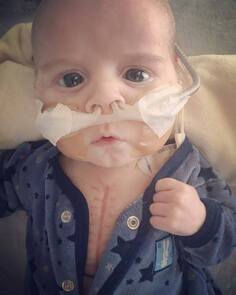
January 10th, 2017 - my wife Stef and I went in for the birth of our second child (Henry) when everything was on time and going according to plan. The last time we were at Southlake Hospital was for the birth of our first daughter (Eleanor) in 2014. The ‘first one’ is supposed to be the hardest, right? Well, I’m not sure if I was unprepared or just optimistic but I didn’t even pack an overnight bag because I figured we didn’t need it. I had the baby bag, my wallet, car keys and cell phone. Off we went.
But, the second experience would turn out to be much different. As the process was moving along, I remember looking at Stef and saying, “this is going very well”, until it wasn’t.
It started with some complications during the birthing processes. The umbilical cord was stuck beneath Henry’s head leading to severe depleted oxygen in the womb. The medical team was able to deliver Henry without any further complications via emergency c-section but everything was a whirlwind for me.
After Henry was born, they felt it was necessary for him to spend the first 36 hours of his life on the chilling pad to help with brain activity after his eventful entrance. But this was when our long Sick Kids journey began as Henry and I were transported from our local hospital to the Hospital for Sick Children by ambulance while Stef recovered where she was.
Remembering that important overnight bag for myself now, I spent the next three nights sleeping on and off in a tiny breast pumping room at Sickkids with very little. Amid all of this, I met a guy who really helped me get through the next few days. He had gone through similar circumstances with his child a few days prior to me and was able to pass on some tips and tricks for me. Mainly, somewhat comfortable places to sleep and the best private bathrooms within the walls of Sick Kids.
Shortly after meeting this new friend of mine, he found out his child was going to be transferred much closer to home. We celebrated together in true brotherhood. He helped me out, more than he can imagine and I haven’t seen him since.
Everyone at Sick Kids is going through a tough time. That’s the nature of the place.
But, the second experience would turn out to be much different. As the process was moving along, I remember looking at Stef and saying, “this is going very well”, until it wasn’t.
It started with some complications during the birthing processes. The umbilical cord was stuck beneath Henry’s head leading to severe depleted oxygen in the womb. The medical team was able to deliver Henry without any further complications via emergency c-section but everything was a whirlwind for me.
After Henry was born, they felt it was necessary for him to spend the first 36 hours of his life on the chilling pad to help with brain activity after his eventful entrance. But this was when our long Sick Kids journey began as Henry and I were transported from our local hospital to the Hospital for Sick Children by ambulance while Stef recovered where she was.
Remembering that important overnight bag for myself now, I spent the next three nights sleeping on and off in a tiny breast pumping room at Sickkids with very little. Amid all of this, I met a guy who really helped me get through the next few days. He had gone through similar circumstances with his child a few days prior to me and was able to pass on some tips and tricks for me. Mainly, somewhat comfortable places to sleep and the best private bathrooms within the walls of Sick Kids.
Shortly after meeting this new friend of mine, he found out his child was going to be transferred much closer to home. We celebrated together in true brotherhood. He helped me out, more than he can imagine and I haven’t seen him since.
Everyone at Sick Kids is going through a tough time. That’s the nature of the place.
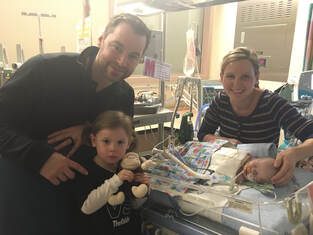
It goes without saying that the staff at Sick Kids save children’s lives every day but what doesn’t get talked about enough is the lives of the parents that they save. The staff constantly pushed me to eat and sleep. They kept saying to me “you need to have a clear head.” and “you need to take care of yourself in order to take care of your children.”
And so yes, it is so important to make sure you are eating and sleeping. If you are not, you cannot think rationally, you cannot make the decisions necessary to get your kid(s) out of there. You will be an emotional wreck, but these two are non-negotiables. You need to eat and sleep. Whatever it takes, figure out a way to get these two necessities done. Once you find this balance, it gets easier, trust me. I’ve been there, I’m closer to everyone I care about as a result of this. You must take care of yourself before you can take care of your kids.
Shortly after being admitted to Sickkids, we discovered the next challenge placed in front of us. He had been diagnosed with a congenital heart condition. It was serious, but treatable. He needed open heart surgery to mend a coarctation (twist) and thinning of his aorta and a VSD repair.
At this point, my daughter actually had no idea what is going on. She went from being the centre of attention at home with me and Stef to having her whole world uprooted and moved to her grandparents for what we thought was going to be just one night. As we tried to explain what was going on with her baby brother, she only had one question on her mind: “Can my brother be at my birthday party?” which was less than two months away.
Children truly have their priorities straight and have a great sense of overall concern.
When we found out that Henry needed open heart surgery, my heart dropped (no pun intended). That is a scary set of words! The doctors explained this was a fairly common heart surgery with an 85-95% success rate and should take roughly 8 hours.
Almost a week later, I’m sitting in the waiting room with Stef, watching as the time continues to roll steadily past the 8-hour mark, the 10-hour mark, the 12-hour mark…. Henry’s first heart surgery did not go as planned, it took 15 long hours and he was immediately placed on ECMO (life support) afterwards. His surgeon, sat with us and explained how he now had a 50/50 chance to make it through the night. What a far cry from the 85-95% success rate I was counting on. I was truly disappointed and downright terrified. The doctor left us with interesting words, he said, “don’t lose faith, you can always have faith”. Faith doesn’t necessarily have to do with a certain religion, but just having something to believe in, at a time like that, it really helped.
Hate to break it to you but, this was also the point where I truly accepted the fact that he may die. He may die before we even had a chance to hold him properly. So now, I pushed. I had to see him. If he was going to die, I did not want him to die alone. I was adamant. The nurses advised heavily against this and kept telling me that this was a bad idea as it was too early after such a long day in surgery. But if you know me, I don’t like taking no for an answer.
Truthfully, I think I may have gotten some of this stubbornness from Henry. Or he got it from me, I don’t know, I’m not a doctor.
I was finally granted my wish to see one-week old Henry straight out of the OR. I was rushed into the CCCU and it was not a scene I was prepared for. There were people scrambling around him, his chest was wide open, and there was blood everywhere. I could see my son, but he was covered in blood. Covered.
I had to leave after sitting and holding his hand for a moment. It was too much. Walking out of the CCCU, I really did not think he was going to make it. Henry, I’m truly sorry I doubted you bud. But that sight, doctors scrambling, blood everywhere, I simply couldn’t take it and I was just so unbelievably tired. I had to leave.
In the waiting room with Stef outside of CCCU, I just kept thinking, “my kid is going to die and I’m not even “Man Enough” to sit with him.” That will forever be the lowest point in my life. I felt like I could not save my son and I could not look after my daughter and I could not protect my family. This was the hardest part of my journey. I crashed. I was wiped out.
We went to bed and physically crashed there. I woke up in the morning and immediately checked my phone. The doctors had advised us that “no news is good news.” Considering everything that had happened the last few days, this was a step in the right direction. Henry had made it through the night and his chances of survival were increasing exponentially every hour he continued to live. We were still in this, together.
This was when my mindset changed – it was time to stop feeling sorry for myself. I needed to do what needed to be done to get through this. I made the decision to be strong, to be available, and to be a father. At this point, every hour that ticked by was another milestone for Henry.
Today, as I am going through some old hospital pictures, Henry rolls by the TV. He notices what’s on the screen and he yells” hey that’s me” with a huge smile on his face (now 4 years old). The picture he was looking at, was him just after his first open heart surgery, still with his chest wide open. We feel that it is extremely important for him to be open and positive about his experience at Sick Kids. A picture he is proud of.
We continued to build on these small wins. Every hour was a win. Every day was a bigger win. Day 12 was a big day for us yet again. Henry had to have his 2nd open heart surgery. This included a cath lab, and another stint on ECMO. All in all, Henry had 11 different blood clots and was also battling chylothorax. The chylothorax extended Henry’s stay at sick kids for an additional 80 days. The Chylo caused his body to leak out all liquids that were put into him. Kind’a tough to bulk a kid up when he can’t hold his nutrients.
And so yes, it is so important to make sure you are eating and sleeping. If you are not, you cannot think rationally, you cannot make the decisions necessary to get your kid(s) out of there. You will be an emotional wreck, but these two are non-negotiables. You need to eat and sleep. Whatever it takes, figure out a way to get these two necessities done. Once you find this balance, it gets easier, trust me. I’ve been there, I’m closer to everyone I care about as a result of this. You must take care of yourself before you can take care of your kids.
Shortly after being admitted to Sickkids, we discovered the next challenge placed in front of us. He had been diagnosed with a congenital heart condition. It was serious, but treatable. He needed open heart surgery to mend a coarctation (twist) and thinning of his aorta and a VSD repair.
At this point, my daughter actually had no idea what is going on. She went from being the centre of attention at home with me and Stef to having her whole world uprooted and moved to her grandparents for what we thought was going to be just one night. As we tried to explain what was going on with her baby brother, she only had one question on her mind: “Can my brother be at my birthday party?” which was less than two months away.
Children truly have their priorities straight and have a great sense of overall concern.
When we found out that Henry needed open heart surgery, my heart dropped (no pun intended). That is a scary set of words! The doctors explained this was a fairly common heart surgery with an 85-95% success rate and should take roughly 8 hours.
Almost a week later, I’m sitting in the waiting room with Stef, watching as the time continues to roll steadily past the 8-hour mark, the 10-hour mark, the 12-hour mark…. Henry’s first heart surgery did not go as planned, it took 15 long hours and he was immediately placed on ECMO (life support) afterwards. His surgeon, sat with us and explained how he now had a 50/50 chance to make it through the night. What a far cry from the 85-95% success rate I was counting on. I was truly disappointed and downright terrified. The doctor left us with interesting words, he said, “don’t lose faith, you can always have faith”. Faith doesn’t necessarily have to do with a certain religion, but just having something to believe in, at a time like that, it really helped.
Hate to break it to you but, this was also the point where I truly accepted the fact that he may die. He may die before we even had a chance to hold him properly. So now, I pushed. I had to see him. If he was going to die, I did not want him to die alone. I was adamant. The nurses advised heavily against this and kept telling me that this was a bad idea as it was too early after such a long day in surgery. But if you know me, I don’t like taking no for an answer.
Truthfully, I think I may have gotten some of this stubbornness from Henry. Or he got it from me, I don’t know, I’m not a doctor.
I was finally granted my wish to see one-week old Henry straight out of the OR. I was rushed into the CCCU and it was not a scene I was prepared for. There were people scrambling around him, his chest was wide open, and there was blood everywhere. I could see my son, but he was covered in blood. Covered.
I had to leave after sitting and holding his hand for a moment. It was too much. Walking out of the CCCU, I really did not think he was going to make it. Henry, I’m truly sorry I doubted you bud. But that sight, doctors scrambling, blood everywhere, I simply couldn’t take it and I was just so unbelievably tired. I had to leave.
In the waiting room with Stef outside of CCCU, I just kept thinking, “my kid is going to die and I’m not even “Man Enough” to sit with him.” That will forever be the lowest point in my life. I felt like I could not save my son and I could not look after my daughter and I could not protect my family. This was the hardest part of my journey. I crashed. I was wiped out.
We went to bed and physically crashed there. I woke up in the morning and immediately checked my phone. The doctors had advised us that “no news is good news.” Considering everything that had happened the last few days, this was a step in the right direction. Henry had made it through the night and his chances of survival were increasing exponentially every hour he continued to live. We were still in this, together.
This was when my mindset changed – it was time to stop feeling sorry for myself. I needed to do what needed to be done to get through this. I made the decision to be strong, to be available, and to be a father. At this point, every hour that ticked by was another milestone for Henry.
Today, as I am going through some old hospital pictures, Henry rolls by the TV. He notices what’s on the screen and he yells” hey that’s me” with a huge smile on his face (now 4 years old). The picture he was looking at, was him just after his first open heart surgery, still with his chest wide open. We feel that it is extremely important for him to be open and positive about his experience at Sick Kids. A picture he is proud of.
We continued to build on these small wins. Every hour was a win. Every day was a bigger win. Day 12 was a big day for us yet again. Henry had to have his 2nd open heart surgery. This included a cath lab, and another stint on ECMO. All in all, Henry had 11 different blood clots and was also battling chylothorax. The chylothorax extended Henry’s stay at sick kids for an additional 80 days. The Chylo caused his body to leak out all liquids that were put into him. Kind’a tough to bulk a kid up when he can’t hold his nutrients.
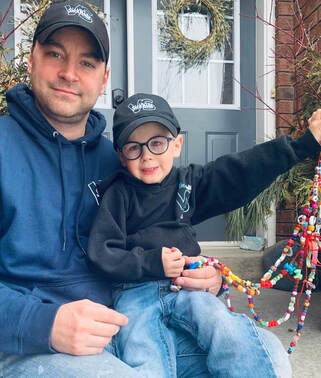
Around the 50-day mark our Doctor decided that the best option for Henrys care was to move him to a satellite room, playfully nicknamed by unidentified staff members as “The Cottage” At first, we were legitimately confused until it was explained to us what The Cottage was in SickKids language. It was a place for families whose children were in limbo, as a sort of vacation. The children weren’t getting better or worse but needed to be close by just in case anything happened.
Our time in The Cottage was very special. We built several lifelong memories and relationships with people who were going through a similar trauma. The culture inside The Cottage in unbelievable. We were extremely fortunate to be roommates with other families who understood everyone else’s pain. The support our families provided one another was life changing.
The immediate goal at this point was to make it to 4D (the Cardiac Recovery Unit at Sick Kids).4D would allow us to actually spend time with our child.4D operates with private room’s that we were allowed to sleep in with our son. They would not transfer us there until Henry stopped draining, and showed that he could hold his nutrients, which he could not.
At this point, we had a 3-month-old wearing a premature baby sleeper with no plan. We needed to find a way to help him put on some weight. We were advised to start feeding him Portagen which is a milk based fat supplement designed to help infants and children gain weight. Henry couldn’t hold the Portagen though. It made him puke non-stop which was extremely discouraging and frustrating. He couldn’t hold down food, and what little he was able to hold down, drained out.
So, we waited and waited and waited for Henry to heal. The staff at Sickkids repeated would tell us that all Henry needed was time and they were right. Henry’s Chylothorax finally passed after 7 long weeks and we were sent to 4D which is where we wanted to be. It meant we were in the transition phase, almost ready to come home for the first time.
Shortly after we were settled in 4D, Henry had a scope done on his throat. He was unable to swallow, actually he had rarely swallowed before in his short life. This was holding us back from getting the full green light to head home. We pushed hard for them to allow us to come home. The only way the doctors could allow this, however, was for us as the parents to learn how to set a feeding tube and be able to administer blood thinner injections.
After a total 96 consecutive days at Sick Kids with several small battles won, against their better judgement, they finally agreed to let us try to go home. We were nervous, but we needed to all be together again and we felt we needed a calmer environment in order for Henry to truly get better. You have to be an advocate for your child. They cannot speak up, so you must. After so many sacrifices, we felt we deserved to be together.
The hardest part of the transition home for me was to try to operate like a regular person again. It was extremely difficult for me to wake up every day and go to work and try to put Henry and our family in the back of my mind while you work. There were a couple occasions where I had to rush home and help change a feeding tube. For Stef though, being that far from Sickkids was a constant stressor. Just in case anything did happen, we were that much farther from help.
One day that I’ll never forget is when, Henry pulled his feeding tube out, but Stef had had enough. She decided to just try and feed him herself using a bottle. At this exact time, I was on the roof fixing some shingles when Stef comes out franticly waving at me. She throws an empty bottle at me from across our front yard (to which I caught) and I looked at her from a far and smiled.
He did it, he took the whole bottle and we’ve never looked back since.
Our time in The Cottage was very special. We built several lifelong memories and relationships with people who were going through a similar trauma. The culture inside The Cottage in unbelievable. We were extremely fortunate to be roommates with other families who understood everyone else’s pain. The support our families provided one another was life changing.
The immediate goal at this point was to make it to 4D (the Cardiac Recovery Unit at Sick Kids).4D would allow us to actually spend time with our child.4D operates with private room’s that we were allowed to sleep in with our son. They would not transfer us there until Henry stopped draining, and showed that he could hold his nutrients, which he could not.
At this point, we had a 3-month-old wearing a premature baby sleeper with no plan. We needed to find a way to help him put on some weight. We were advised to start feeding him Portagen which is a milk based fat supplement designed to help infants and children gain weight. Henry couldn’t hold the Portagen though. It made him puke non-stop which was extremely discouraging and frustrating. He couldn’t hold down food, and what little he was able to hold down, drained out.
So, we waited and waited and waited for Henry to heal. The staff at Sickkids repeated would tell us that all Henry needed was time and they were right. Henry’s Chylothorax finally passed after 7 long weeks and we were sent to 4D which is where we wanted to be. It meant we were in the transition phase, almost ready to come home for the first time.
Shortly after we were settled in 4D, Henry had a scope done on his throat. He was unable to swallow, actually he had rarely swallowed before in his short life. This was holding us back from getting the full green light to head home. We pushed hard for them to allow us to come home. The only way the doctors could allow this, however, was for us as the parents to learn how to set a feeding tube and be able to administer blood thinner injections.
After a total 96 consecutive days at Sick Kids with several small battles won, against their better judgement, they finally agreed to let us try to go home. We were nervous, but we needed to all be together again and we felt we needed a calmer environment in order for Henry to truly get better. You have to be an advocate for your child. They cannot speak up, so you must. After so many sacrifices, we felt we deserved to be together.
The hardest part of the transition home for me was to try to operate like a regular person again. It was extremely difficult for me to wake up every day and go to work and try to put Henry and our family in the back of my mind while you work. There were a couple occasions where I had to rush home and help change a feeding tube. For Stef though, being that far from Sickkids was a constant stressor. Just in case anything did happen, we were that much farther from help.
One day that I’ll never forget is when, Henry pulled his feeding tube out, but Stef had had enough. She decided to just try and feed him herself using a bottle. At this exact time, I was on the roof fixing some shingles when Stef comes out franticly waving at me. She throws an empty bottle at me from across our front yard (to which I caught) and I looked at her from a far and smiled.
He did it, he took the whole bottle and we’ve never looked back since.
Elaina's story by mama kristina
•••Joseph Brant Hospital- burlington, ON
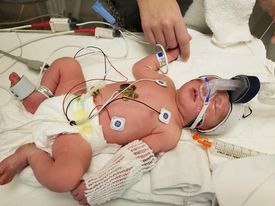
On December 6th, 2017 at 2:42 pm my daughter, Elaina was born. This was my first child and first experience with childbirth, becoming a mother, all the firsts! Lets back track a little bit before I get into my story…
Before Elaina was conceived, I had two back-to-back miscarriages which completely devastated me. I had no issues getting pregnant, but holding the pregnancy was a different issue in itself. October 2016 and January 2017 were very difficult times in my life.
I found an OB after my second miscarriage who was referred to me at the hospital when I was in emergency which changed everything around for me. He was kind, understanding, gentle and assured me that he would take care of me. For some reason, immediately I was at ease being in his personal care. He told me the next time I get pregnant to contact him immediately and he would begin to monitor me and give me progesterone to hold the pregnancy which I had to insert every night for about 3-4 months.
I found out I was carrying a girl during a 3D ultrasound appointment in July 2017, since at my anatomy ultrasound she was hiding, and it was difficult to tell. To say I was excited was a complete understatement, having married into a male dominated family and was literally carrying the little girl my mother-in-law never had (she had 3 boys, my husband being the oldest).
When individuals would ask me what I was most excited about I would always respond “That moment when they put your baby on your chest and you meet this wonderful human being that you have been waiting to meet for 9 months”.
That moment came when I was “done” pushing and felt that relief that my baby was out. I immediately began to cry profusely and uncontrollably just overcome with emotion and joy. I was pushing for about 1 hour and 30 minutes before she finally came by the grace of God on my final push before we went to other measures (suction, C-section).
However, when I realized the baby wasn’t crying, I turned to my husband and asked, “Why isn’t the baby crying?” I remember him not responding (he wanted to keep me calm and try not to freak out) and all of a sudden a bunch of people who were on “stand by” such as a nurse, RT, etc. (who by the way I didn’t even realize were standing in the room while I was pushing) began working on my daughter and sucking up mucus from her lungs. I couldn’t see what was happening as the plastic bassinet where Elaina was lying was located higher than my bed and there were 3-4 people working on her.
While all of this is happening, I am also delivering my placenta (being pushed out of my stomach) and getting stitched up by the doctor as I had 4th degree tears. It all happened very quickly and they said they were taking her to the NICU to get her on a CPAP machine to help her breathe.
Elaina was born with a large amount of thick mucus in her lungs that was not easily sucked out by the RT when she put the straw down her throat into her lungs. It was very thick and they pushed her in the plastic bassinet down the hall to the NICU. My husband followed my daughter to the NICU and after the doctor finished working on me, I was left alone in my hospital room.
At this point, I had no idea what was happening with my daughter, where my husband was, or where my family was. I kept wondering where my mom was and how I wanted to see her. I felt like I was in that room alone for a long time just wondering what was happening. I haven’t even seen my daughter yet as she was taken immediately.
I was robbed of that moment I was looking forward to the most. That first meeting with my child. Holding my child for the first time, looking at her face, cuddling her, kissing her….I was angry for a long time having felt like that moment was stolen from me. Haven’t I been through enough losing two babies? Wasn’t this supposed to be my miracle baby? My rainbow baby? This isn’t the way things are supposed to go…needless to say I was in shock.
Thankfully, this did not affect her development. She was in the NICU for 5 days in total, Wednesday-Monday and then we were discharged from the hospital. Elaina was on a CPAP machine for the first 2 days of her life. NICU was under construction at that time, so I had to “cowgirl walk” or before my catheter came out, get rolled by a wheelchair or even my bed to go visit her and hold her hand through the incubator. Elaina was on a CPAP machine for the first two days, and then when she came out of the incubator, I had my moment….I got to finally hold my baby for the first time. A moment that I will never forget that happened in a NICU that was being renovated and had 5-6 babies with curtains between all of us for privacy. But, I was happy she was off the CPAP and closer to getting healthy. For the last 3 days, they kept her on IV for medicine and for nutrition to ensure that the thick mucus would leave her lungs.
What caused this to happen? They couldn’t answer that question which was frustrating. She could’ve swallowed a lot of mucus on her way out, or it could’ve happened in the womb. Regardless, I tried not to feel like it was all my fault that I couldn’t get her out of my body faster, maybe then this could’ve all been prevented.
Before Elaina was conceived, I had two back-to-back miscarriages which completely devastated me. I had no issues getting pregnant, but holding the pregnancy was a different issue in itself. October 2016 and January 2017 were very difficult times in my life.
I found an OB after my second miscarriage who was referred to me at the hospital when I was in emergency which changed everything around for me. He was kind, understanding, gentle and assured me that he would take care of me. For some reason, immediately I was at ease being in his personal care. He told me the next time I get pregnant to contact him immediately and he would begin to monitor me and give me progesterone to hold the pregnancy which I had to insert every night for about 3-4 months.
I found out I was carrying a girl during a 3D ultrasound appointment in July 2017, since at my anatomy ultrasound she was hiding, and it was difficult to tell. To say I was excited was a complete understatement, having married into a male dominated family and was literally carrying the little girl my mother-in-law never had (she had 3 boys, my husband being the oldest).
When individuals would ask me what I was most excited about I would always respond “That moment when they put your baby on your chest and you meet this wonderful human being that you have been waiting to meet for 9 months”.
That moment came when I was “done” pushing and felt that relief that my baby was out. I immediately began to cry profusely and uncontrollably just overcome with emotion and joy. I was pushing for about 1 hour and 30 minutes before she finally came by the grace of God on my final push before we went to other measures (suction, C-section).
However, when I realized the baby wasn’t crying, I turned to my husband and asked, “Why isn’t the baby crying?” I remember him not responding (he wanted to keep me calm and try not to freak out) and all of a sudden a bunch of people who were on “stand by” such as a nurse, RT, etc. (who by the way I didn’t even realize were standing in the room while I was pushing) began working on my daughter and sucking up mucus from her lungs. I couldn’t see what was happening as the plastic bassinet where Elaina was lying was located higher than my bed and there were 3-4 people working on her.
While all of this is happening, I am also delivering my placenta (being pushed out of my stomach) and getting stitched up by the doctor as I had 4th degree tears. It all happened very quickly and they said they were taking her to the NICU to get her on a CPAP machine to help her breathe.
Elaina was born with a large amount of thick mucus in her lungs that was not easily sucked out by the RT when she put the straw down her throat into her lungs. It was very thick and they pushed her in the plastic bassinet down the hall to the NICU. My husband followed my daughter to the NICU and after the doctor finished working on me, I was left alone in my hospital room.
At this point, I had no idea what was happening with my daughter, where my husband was, or where my family was. I kept wondering where my mom was and how I wanted to see her. I felt like I was in that room alone for a long time just wondering what was happening. I haven’t even seen my daughter yet as she was taken immediately.
I was robbed of that moment I was looking forward to the most. That first meeting with my child. Holding my child for the first time, looking at her face, cuddling her, kissing her….I was angry for a long time having felt like that moment was stolen from me. Haven’t I been through enough losing two babies? Wasn’t this supposed to be my miracle baby? My rainbow baby? This isn’t the way things are supposed to go…needless to say I was in shock.
Thankfully, this did not affect her development. She was in the NICU for 5 days in total, Wednesday-Monday and then we were discharged from the hospital. Elaina was on a CPAP machine for the first 2 days of her life. NICU was under construction at that time, so I had to “cowgirl walk” or before my catheter came out, get rolled by a wheelchair or even my bed to go visit her and hold her hand through the incubator. Elaina was on a CPAP machine for the first two days, and then when she came out of the incubator, I had my moment….I got to finally hold my baby for the first time. A moment that I will never forget that happened in a NICU that was being renovated and had 5-6 babies with curtains between all of us for privacy. But, I was happy she was off the CPAP and closer to getting healthy. For the last 3 days, they kept her on IV for medicine and for nutrition to ensure that the thick mucus would leave her lungs.
What caused this to happen? They couldn’t answer that question which was frustrating. She could’ve swallowed a lot of mucus on her way out, or it could’ve happened in the womb. Regardless, I tried not to feel like it was all my fault that I couldn’t get her out of my body faster, maybe then this could’ve all been prevented.
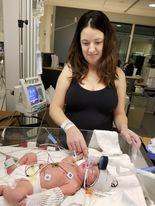
The hardest part of my journey was watching my daughter hooked up to the machines and not being able to hold her. Feeling like I was robbed of that moment that I was so looking forward to. It was forever destroyed for me and I was pretty scarred from childbirth. I didn’t lie eyes on my child for 5-6 hours after she was born where I was wheeled in my hospital bed beside her incubator in the crowded and under construction NICU I described. I also recall being in my semi-private room and looking at the mom across from me with her baby beside her in her room and being a little jealous and resentful that she got to have her baby 24/7 in her room and I had to walk down the hallway to visit mine. It didn’t seem fair.
Hubby's response: The hardest part of my journey was seeing my daughter as she came out blue and barely breathing and they were frantically working on her. They were trying to act like everything was calm, but you can tell there was a sense of real urgency in their actions and how fast, the speed of which they were doing what they were doing. I am very good at reading people (what they are not saying) and by the way they were acting, the sound in their voices, the urgency in which they were doing everything I could tell something wasn’t right. The happiest moment of my life turned into what I thought was going to be the worst moment of my life. After that, seeing her on all those machines not knowing how she was going to come out of this. I didn’t know what happened to her, and the sense of not knowing anything was anxiety provoking. They themselves weren’t sure what the outcome was going to be at first. They didn’t know what damage was done, what was done, how it would affect her, they themselves were not sure and said “wait and see” how she would react. They never saw a baby with so much fluid in their lungs before. Another hard thing was trying to keep my wife calm and relaxed while I was freaking out inside. She had no clue what was going on. I saw everything first-hand as she was lying lower on the bed.
Hubby's feedback based on their transition home: the hardest part about going home was not having access to nurses 24/7 as we had in the NICU. Especially being a first-time parent, if something more was wrong that they didn’t catch and would happen while we were on the clock, per say. Wondering if she truly was okay, even though the nurses and doctors said they were impressed with how quickly she bounced back and recovered. They were pretty worried and scared at first, but said she came out of it surprisingly well and very strong. You always second guess to yourself is she really okay? What if something else happens at home and you don’t have those nurses and doctors right there at your finger-tips? What if the doctors missed something? I would wake up several times a night and just check on her to make sure she was okay and breathing. There was so much reassurance being in the NICU and having nurses right there beside you. It provided a sense of peace and calm if something bad were to happen, they are right there and know what to do in an emergency situation.
I agree with all of the above that my husband stated. The NICU nurses were angels. Each one was so loving, caring and genuinely cared about you. One nurse in particular named Dianne who had been a nurse at the hospital for 25+ years was especially wonderful, and I will never forget her kindness. I called the maternity ward at the hospital to ask when she was working and got custom made cookies made for her that said and the NICU nursing staff that said “Elaina’s Angels” along with a thank-you note. Unfortunately, she happened to be sick that day and wasn’t in, so I never had the chance to personally deliver it to her and speak to her, but it was left at the ward for her and the staff. They are the sole reason my daughter is alive today and I will forever be grateful. I don’t take my healthy daughter for granted, ever.
Hubby's response: The hardest part of my journey was seeing my daughter as she came out blue and barely breathing and they were frantically working on her. They were trying to act like everything was calm, but you can tell there was a sense of real urgency in their actions and how fast, the speed of which they were doing what they were doing. I am very good at reading people (what they are not saying) and by the way they were acting, the sound in their voices, the urgency in which they were doing everything I could tell something wasn’t right. The happiest moment of my life turned into what I thought was going to be the worst moment of my life. After that, seeing her on all those machines not knowing how she was going to come out of this. I didn’t know what happened to her, and the sense of not knowing anything was anxiety provoking. They themselves weren’t sure what the outcome was going to be at first. They didn’t know what damage was done, what was done, how it would affect her, they themselves were not sure and said “wait and see” how she would react. They never saw a baby with so much fluid in their lungs before. Another hard thing was trying to keep my wife calm and relaxed while I was freaking out inside. She had no clue what was going on. I saw everything first-hand as she was lying lower on the bed.
Hubby's feedback based on their transition home: the hardest part about going home was not having access to nurses 24/7 as we had in the NICU. Especially being a first-time parent, if something more was wrong that they didn’t catch and would happen while we were on the clock, per say. Wondering if she truly was okay, even though the nurses and doctors said they were impressed with how quickly she bounced back and recovered. They were pretty worried and scared at first, but said she came out of it surprisingly well and very strong. You always second guess to yourself is she really okay? What if something else happens at home and you don’t have those nurses and doctors right there at your finger-tips? What if the doctors missed something? I would wake up several times a night and just check on her to make sure she was okay and breathing. There was so much reassurance being in the NICU and having nurses right there beside you. It provided a sense of peace and calm if something bad were to happen, they are right there and know what to do in an emergency situation.
I agree with all of the above that my husband stated. The NICU nurses were angels. Each one was so loving, caring and genuinely cared about you. One nurse in particular named Dianne who had been a nurse at the hospital for 25+ years was especially wonderful, and I will never forget her kindness. I called the maternity ward at the hospital to ask when she was working and got custom made cookies made for her that said and the NICU nursing staff that said “Elaina’s Angels” along with a thank-you note. Unfortunately, she happened to be sick that day and wasn’t in, so I never had the chance to personally deliver it to her and speak to her, but it was left at the ward for her and the staff. They are the sole reason my daughter is alive today and I will forever be grateful. I don’t take my healthy daughter for granted, ever.
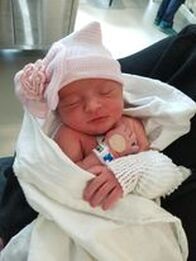
The advice I would give NICU parents is to be as calm as you can because your baby is in the best place they can possibly be. They are surrounded by 24/7 nurses and doctors who are right there should something go awry. They are excellent at what they do and answer every question or concern that you might have, even in the middle of the night during a visit with your baby. It takes a special kind of nurse to work in the NICU with the most vulnerable children. Know that everything is being done for your child that they possibly can do.
To conclude, through all of this, even when I didn’t know what was happening with my daughter and I didn’t meet her yet, I somehow convinced myself that it was going to be okay. I refused to believe that God was going to take my baby away from me. This ultimately helped me cope, along with the love and support of my family and the beautiful staff in the maternity ward/NICU of Joseph Brant Hospital. Elaina just turned 3 this past December and is still healthy, and I thank God every day for that gift.
To conclude, through all of this, even when I didn’t know what was happening with my daughter and I didn’t meet her yet, I somehow convinced myself that it was going to be okay. I refused to believe that God was going to take my baby away from me. This ultimately helped me cope, along with the love and support of my family and the beautiful staff in the maternity ward/NICU of Joseph Brant Hospital. Elaina just turned 3 this past December and is still healthy, and I thank God every day for that gift.
Naya's Story by mama Stephanie
•••SICKKIDS - TORONTO, ON
y husband and I found out we were pregnant early on in my pregnancy. We had our first ultrasound around 7 weeks and again at 11 weeks which confirmed I was pregnant with identical twins. Soon after, we found out something was wrong with Twin B’s spine and she seemed to have a tumour in her belly. We were immediately referred to the High Risk Pregnancy Clinic at Mount Sinai Hospital where the geneticist and OB confirm she in fact had an abdominal wall defect called an Omphalocele. She also had Scoliosis and was not growing properly. My pregnancy was monitored fairly closely and I was terrified of what was to come. We were asked on numerous occasions if we would like to have selective reduction which is is the practice of eliminating the number of fetuses in a multiple pregnancy. We simply said “no thanks". I wanted to give both my babies a fighting chance.
We decided we would Name twin A Milayna and Twin B Naya.
Naya was born at 30 weeks gestation at Mount Sinai Hospital in Toronto, Ontario. She was transferred to SickKids Hospital in Toronto a few hours later. She was born with an Omphalocele, Scoliosis, PFFD and complex Cardiac Conditions (DORV, TOF, ASD, VSD). Naya had her first of many surgeries at only 4 days old to close her Omphalocele. Later shee had a G-tube placed while she waited in hospital to have her heart surgery. She was too sick to come home and wait for surgery as most children do. Naya had her first open heart surgery at 8 months old. The surgery lasted over 11 hours. A few hours after surgery, she suffered a cardiac arrest and was put on ECMO (breathing machine) for 5 days. Her chest remained open for another week. 2 weeks after Naya’s first open heart surgery, she went in for a second unexpected heart surgery. Naya suffered a left ischemic stroke a few days later, followed by a seizure. The electricity in her heart never fully returned; as a result, she needed surgery to get a permanent pacemaker inserted. Naya has many complications after her open heart surgeries; especially from the fluid overload and kidney injuries. She was finally discharged home for the first time in her life at 14.5 months old. A few weeks later, she was accepted into Holland Bloorview rehab Hospital for inpatient therapy over a 2 month period. Today Naya is 4.5 years old and is successfully learning to talk, crawl, sit on her own etc... with the help of therapy and practice. She still amazes her doctors!
There were many difficult times during our journey especially at night as an inpatient and outpatient. The hardest part about being in hospital for that length of time was not being able to see my daughter Milayna everyday as she was staying with family while I lived at SickKids with Naya. I felt like I was missing out on everything. At the same time, I knew Naya needed me to be her advocate and comfort her during her hard times. From seeing my child laying in a bed lifeless, with wires & tubes everywhere, while clinging to life is something I will never forget for the rest of my life. Although, I no longer sit dwelling on that experience daily, it has definitely changed me as a person. I no longer take life for granted and know that each day is a gift. Not every parent is as lucky as we were. Naya is our miracle.
The transition home was a lot harder than I had imagined. I dreamed of the day we would be home all together as a family enjoying life but never did I think it would be as difficult as it was. When Naya was first discharged home, she had multiple Sickkids appointments each week for months on end. She was still not well but she was stable enough to be home. There were so many unknowns, countless G-tube feeds throughout the day, not to mention 13 medications to give her every couple of hours. I was exhausted both mentally and physically. I also felt alone. I missed having the interactions and friendships that I built with the staff and other families on a daily basis. I didn’t feel like anyone outside the hospital understood. Every little hiccup Naya would have, would cause us to rush her to the ER. Her health was very unpredictable. Factors such as the common cold could cause her to go into heart, kidney and/or renal failure within a matter of hours. I wasn’t going to take any chances at that point so I continued to stay home as I believed it was the safest option for my family. Overtime, the paranoia pasted as Naya was becoming healthier and more stable.
If I have any advice to give current NICU/hospital parents it would be to not count the days. Take each day, each moment, each hour or minute at a time. Also, never give up hope. As sick as my daughter was at times, I never stopped believing in her. I feel like she could feel my energy and if I was negative or hopeless, than I felt she too would give up. Advocating is another huge tip I give new NICU/hospital parents. Advocating doesn’t mean going against anyone or yelling at or blaming anyone. In the simplest of terms, to me advocating is being there as much as possible. Getting to know your child and their signs and their likes and dislikes. Speaking up when you feel something is off or asking for a second opinion if you feel like you are not being heard. Advocating is writing down details of medications your child reacts badly to, medications that haven’t worked or medications that do work. It’s keeping track of when and how your child desats (oxygen levels drops) or vomits regularly. This is what advocating means to me. I’ve been told on numerous occasions by the SickKids staff that if I wasn’t there everyday advocating for Naya, that she wouldn’t be here today. When the staff see her today, they are shocked to see this little girl thriving and proving everyone wrong.
And lastly, find your support. I mean find people who are going through exactly what you are going through. These people are the ones that will understand you and be there for you when times are tough and dark. These people will be your tribe.
We decided we would Name twin A Milayna and Twin B Naya.
Naya was born at 30 weeks gestation at Mount Sinai Hospital in Toronto, Ontario. She was transferred to SickKids Hospital in Toronto a few hours later. She was born with an Omphalocele, Scoliosis, PFFD and complex Cardiac Conditions (DORV, TOF, ASD, VSD). Naya had her first of many surgeries at only 4 days old to close her Omphalocele. Later shee had a G-tube placed while she waited in hospital to have her heart surgery. She was too sick to come home and wait for surgery as most children do. Naya had her first open heart surgery at 8 months old. The surgery lasted over 11 hours. A few hours after surgery, she suffered a cardiac arrest and was put on ECMO (breathing machine) for 5 days. Her chest remained open for another week. 2 weeks after Naya’s first open heart surgery, she went in for a second unexpected heart surgery. Naya suffered a left ischemic stroke a few days later, followed by a seizure. The electricity in her heart never fully returned; as a result, she needed surgery to get a permanent pacemaker inserted. Naya has many complications after her open heart surgeries; especially from the fluid overload and kidney injuries. She was finally discharged home for the first time in her life at 14.5 months old. A few weeks later, she was accepted into Holland Bloorview rehab Hospital for inpatient therapy over a 2 month period. Today Naya is 4.5 years old and is successfully learning to talk, crawl, sit on her own etc... with the help of therapy and practice. She still amazes her doctors!
There were many difficult times during our journey especially at night as an inpatient and outpatient. The hardest part about being in hospital for that length of time was not being able to see my daughter Milayna everyday as she was staying with family while I lived at SickKids with Naya. I felt like I was missing out on everything. At the same time, I knew Naya needed me to be her advocate and comfort her during her hard times. From seeing my child laying in a bed lifeless, with wires & tubes everywhere, while clinging to life is something I will never forget for the rest of my life. Although, I no longer sit dwelling on that experience daily, it has definitely changed me as a person. I no longer take life for granted and know that each day is a gift. Not every parent is as lucky as we were. Naya is our miracle.
The transition home was a lot harder than I had imagined. I dreamed of the day we would be home all together as a family enjoying life but never did I think it would be as difficult as it was. When Naya was first discharged home, she had multiple Sickkids appointments each week for months on end. She was still not well but she was stable enough to be home. There were so many unknowns, countless G-tube feeds throughout the day, not to mention 13 medications to give her every couple of hours. I was exhausted both mentally and physically. I also felt alone. I missed having the interactions and friendships that I built with the staff and other families on a daily basis. I didn’t feel like anyone outside the hospital understood. Every little hiccup Naya would have, would cause us to rush her to the ER. Her health was very unpredictable. Factors such as the common cold could cause her to go into heart, kidney and/or renal failure within a matter of hours. I wasn’t going to take any chances at that point so I continued to stay home as I believed it was the safest option for my family. Overtime, the paranoia pasted as Naya was becoming healthier and more stable.
If I have any advice to give current NICU/hospital parents it would be to not count the days. Take each day, each moment, each hour or minute at a time. Also, never give up hope. As sick as my daughter was at times, I never stopped believing in her. I feel like she could feel my energy and if I was negative or hopeless, than I felt she too would give up. Advocating is another huge tip I give new NICU/hospital parents. Advocating doesn’t mean going against anyone or yelling at or blaming anyone. In the simplest of terms, to me advocating is being there as much as possible. Getting to know your child and their signs and their likes and dislikes. Speaking up when you feel something is off or asking for a second opinion if you feel like you are not being heard. Advocating is writing down details of medications your child reacts badly to, medications that haven’t worked or medications that do work. It’s keeping track of when and how your child desats (oxygen levels drops) or vomits regularly. This is what advocating means to me. I’ve been told on numerous occasions by the SickKids staff that if I wasn’t there everyday advocating for Naya, that she wouldn’t be here today. When the staff see her today, they are shocked to see this little girl thriving and proving everyone wrong.
And lastly, find your support. I mean find people who are going through exactly what you are going through. These people are the ones that will understand you and be there for you when times are tough and dark. These people will be your tribe.
Luca's Story by Mama Luiza B.A. Hons., B.Sc.N(c)
•••SickKids - Toronto, ON
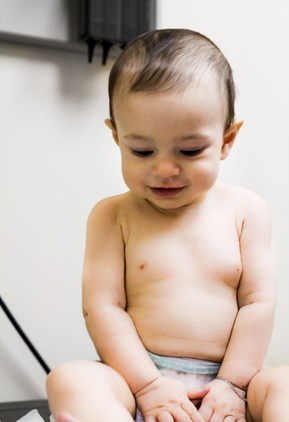
Hi Kayla and Jessica,
Here is our story. I guess it starts with a little background context on my husband Michael, Luca's dad. I'll try to translate medical jargon as best I can!
Michael was born with a bicuspid aortic valve, which means his aortic valve has two leaflets instead of the three it should normally have. When this happens, the valve doesn't close quite right and can cause the blood being pumped out of the left ventricle to back-flow, or "regurgitate". Michael's regurgitation was severe and he required open heart surgery to replace the valve with a titanium one. But along with this life-saving device comes a lifetime of warfarin therapy to thin the blood and prevent clotting around the device that could break off and enter the circulation. Warfarin therapy is serious and requires lifestyle changes, as well as constant monitoring for INR, interactions between other meds and even some foods! A few years later, his chest was opened up again - this time to repair and replace a portion of his thoracic aorta which had dilated, also known as aneurysm. The ultrasound tech noticed an anomaly during his routine yearly cardio checkup and ran to get the cardiologist. Sidenote: Never underestimate the ability of a tech, nurse, or other non-MD member of a team to catch something and save your life! Days later, he was the owner of a brand new prosthetic aorta to go with that shiny valve after a fairly risky surgery that involved cardiac bypass - a process where the heart is temporarily stopped and then restarted! Michael is well and healthy now, working as a tradesman, 6'4" and a big teddy bear. If the room is quiet enough, that's his valve ticking - not a clock! It's one of my favourite sounds in the world. What a miracle to be able to hear the thing that's saving your life working, every little tick announcing a successful heartbeat.
When we found out we were expecting...the very first thing after the "Holy SH*T!" shock wore off (we were not planning!) was wondering whether or not our baby would have a major cardiac defect. One of my doctors kept it real and said there were about 1 in 4 odds that there would be. We mentally prepared for the ultrasound to find something the docs call "incompatible with life", or for something that might require instant action after delivery. We shed many tears thinking about having to send our baby off to be opened up the way dad was. The only thing that comforted our worries was knowing that we had access to SickKids in Toronto and their world-class expertise would mean our baby was in the best of hands.
During my pregnancy, my ultrasounds were more frequent than usual and completed by a paediatric cardiologist. She told us that all looked normal but she would need to see the baby at 3 months old. We breathed a huge sigh of relief and enjoyed an otherwise rather uneventful pregnancy and a really great birth experience thanks to my midwives (and, uh, an epidural). I had gestational diabetes and required daily insulin so my midwives could no longer provide me primary care but assured me that they would be there at the birth, and they were the very first hands that held my sweet 6lb boy after the attending OB delivered him.
Luca had a tiny NICU stay when they tested his blood sugar and it was a little too low (a common finding with diabetic moms) and he needed to stay until he had 2 stable consecutive readings after formula supplementation. Those 6 hours felt awful and I couldn't relax despite the nurses telling me to chill and that everything was fine. The stamina required by moms supporting long-term NICU babies leaves me in total silent awe. NICU moms brave the unknown on a daily and even hourly basis and embody the type of selflessness that is rarely seen outside that environment.
Fast forward to our 3 month appointment. This was where we would learn if Luca's heart developed normally and for the first look at his heart directly with an ultrasound. He nursed and took the OS wand like a champ. The doc returned and told us that Luca's aorta was a little bit different (cue our stomachs dropping) and that he had a hole in his heart called a patent foramen ovale (PFO). Luca has ARSA - an aberrant right subclavian artery, which means the RS artery branches off the aortic trunk in a different place than it should. She wanted to see Luca back at 1 year old to assess if the PFO closed. She advised that if it hadn't closed at a year, we'd need to talk about repairing it. She also told me that ARSA can cause issues with swallowing because that wonky little rebel artery can wrap around the esophagus and obstruct it as he grows. She told me to monitor him and that she'd see me in a few months. I wasn't totally at ease but I went home grateful that it wasn't something immediately life-threatening. I sat in my car and cried and knew that getting home and telling Mike would trigger a huge sense of crushing guilt. I was right. We cried some more while I consoled him and told him it would be okay and it wasn't his fault, these things happen. The best we could do is keep watch and monitor and do what we needed to do if we needed to act. We didn't have much support from family and we navigated the fear and anxiety pretty much alone.
Fast forward again to the 1 year appointment. Luca's PFO had closed and we averted surgical repair! No swallowing issues whatsoever meant that Luca was ready to be released from cardiology care. Truly one of the happiest days of my life with LOTS more tears...this time from relief. Below is a photo of Luca on the day we found out no surgery was needed.
Here are my two cents. I don't know what it's like to brave the long hours, days, and months with a child in the NICU. I hope I never know. I do know we aren't built to handle the gravity of navigating life with a medically complex child alone. Support, community, advocacy, self-care, and sharing lived experiences can make a world of difference. I also know what it means to second guess every single choice I've made since the moment I learned I'd become a mother. I know what it is to live in fear for months, hold my breath during every test, wait for This Phone Call or That Phone Call, those charts, these odds, the what-ifs, and why-mes. I know what's its like to lose sleep to researching every possible outcome or scenario. I know what it's like to wonder what would happen if we had a second child. Giving Luca a sibling means that child could be born with no defects, mild "variants" or grave conditions requiring dramatic action. I know what it's like to feel triggered by pictures, tv shows, movies, commercials. I burst into tears during a lecture where they showed a little boy recovering from cardiac surgery because that very easily could have been my boy. The most jarring effect of motherhood on my psyche has been the way every child is my child. Looking at someone's own situation and putting our child's face on it. Empathy is a hell of a drug.
Thanks for reading my story. Reading the other stories has made me so grateful for spaces that foster conversation and openness. I briefly thought my story wouldn't be "good enough" because my son is relatively healthy. But there is no Suffering Olympics. There are no medals for having the most complicated case or the longest NICU stay or the worst prognosis. We're all just people who love our children and sometimes genetics, nature, biology, and factors both within and beyond our control just go awry. It is deeply human to search for answers and so it is deeply human to feel guilt, shame, confusion, rage and despair when there aren't any, or when the answer isn't the one we hoped for. As I finish up my nursing degree, I look forward to a career as a NICU nurse and caring for you and your babies as I would care for my own. As a researcher and anthropologist, I also look forward to exploring the NICU space beyond the complicated technologies and advanced, highly specialized expertise. In the walls of the NICU there is profound joy and staggering devastation. Crushing anxiety and deep relief. Intense trust placed on strangers. Raw vulnerability at the forefront of every interaction. Time exists differently in the NICU. Energy flows differently in the NICU. What a privilege to get to witness the full spectrum of human emotion in a place where life begins, and sometimes ends. Thank you to Kayla and Jessica for bring a piece of that tiny universe into sight with Beyond the Beads.
Here is our story. I guess it starts with a little background context on my husband Michael, Luca's dad. I'll try to translate medical jargon as best I can!
Michael was born with a bicuspid aortic valve, which means his aortic valve has two leaflets instead of the three it should normally have. When this happens, the valve doesn't close quite right and can cause the blood being pumped out of the left ventricle to back-flow, or "regurgitate". Michael's regurgitation was severe and he required open heart surgery to replace the valve with a titanium one. But along with this life-saving device comes a lifetime of warfarin therapy to thin the blood and prevent clotting around the device that could break off and enter the circulation. Warfarin therapy is serious and requires lifestyle changes, as well as constant monitoring for INR, interactions between other meds and even some foods! A few years later, his chest was opened up again - this time to repair and replace a portion of his thoracic aorta which had dilated, also known as aneurysm. The ultrasound tech noticed an anomaly during his routine yearly cardio checkup and ran to get the cardiologist. Sidenote: Never underestimate the ability of a tech, nurse, or other non-MD member of a team to catch something and save your life! Days later, he was the owner of a brand new prosthetic aorta to go with that shiny valve after a fairly risky surgery that involved cardiac bypass - a process where the heart is temporarily stopped and then restarted! Michael is well and healthy now, working as a tradesman, 6'4" and a big teddy bear. If the room is quiet enough, that's his valve ticking - not a clock! It's one of my favourite sounds in the world. What a miracle to be able to hear the thing that's saving your life working, every little tick announcing a successful heartbeat.
When we found out we were expecting...the very first thing after the "Holy SH*T!" shock wore off (we were not planning!) was wondering whether or not our baby would have a major cardiac defect. One of my doctors kept it real and said there were about 1 in 4 odds that there would be. We mentally prepared for the ultrasound to find something the docs call "incompatible with life", or for something that might require instant action after delivery. We shed many tears thinking about having to send our baby off to be opened up the way dad was. The only thing that comforted our worries was knowing that we had access to SickKids in Toronto and their world-class expertise would mean our baby was in the best of hands.
During my pregnancy, my ultrasounds were more frequent than usual and completed by a paediatric cardiologist. She told us that all looked normal but she would need to see the baby at 3 months old. We breathed a huge sigh of relief and enjoyed an otherwise rather uneventful pregnancy and a really great birth experience thanks to my midwives (and, uh, an epidural). I had gestational diabetes and required daily insulin so my midwives could no longer provide me primary care but assured me that they would be there at the birth, and they were the very first hands that held my sweet 6lb boy after the attending OB delivered him.
Luca had a tiny NICU stay when they tested his blood sugar and it was a little too low (a common finding with diabetic moms) and he needed to stay until he had 2 stable consecutive readings after formula supplementation. Those 6 hours felt awful and I couldn't relax despite the nurses telling me to chill and that everything was fine. The stamina required by moms supporting long-term NICU babies leaves me in total silent awe. NICU moms brave the unknown on a daily and even hourly basis and embody the type of selflessness that is rarely seen outside that environment.
Fast forward to our 3 month appointment. This was where we would learn if Luca's heart developed normally and for the first look at his heart directly with an ultrasound. He nursed and took the OS wand like a champ. The doc returned and told us that Luca's aorta was a little bit different (cue our stomachs dropping) and that he had a hole in his heart called a patent foramen ovale (PFO). Luca has ARSA - an aberrant right subclavian artery, which means the RS artery branches off the aortic trunk in a different place than it should. She wanted to see Luca back at 1 year old to assess if the PFO closed. She advised that if it hadn't closed at a year, we'd need to talk about repairing it. She also told me that ARSA can cause issues with swallowing because that wonky little rebel artery can wrap around the esophagus and obstruct it as he grows. She told me to monitor him and that she'd see me in a few months. I wasn't totally at ease but I went home grateful that it wasn't something immediately life-threatening. I sat in my car and cried and knew that getting home and telling Mike would trigger a huge sense of crushing guilt. I was right. We cried some more while I consoled him and told him it would be okay and it wasn't his fault, these things happen. The best we could do is keep watch and monitor and do what we needed to do if we needed to act. We didn't have much support from family and we navigated the fear and anxiety pretty much alone.
Fast forward again to the 1 year appointment. Luca's PFO had closed and we averted surgical repair! No swallowing issues whatsoever meant that Luca was ready to be released from cardiology care. Truly one of the happiest days of my life with LOTS more tears...this time from relief. Below is a photo of Luca on the day we found out no surgery was needed.
Here are my two cents. I don't know what it's like to brave the long hours, days, and months with a child in the NICU. I hope I never know. I do know we aren't built to handle the gravity of navigating life with a medically complex child alone. Support, community, advocacy, self-care, and sharing lived experiences can make a world of difference. I also know what it means to second guess every single choice I've made since the moment I learned I'd become a mother. I know what it is to live in fear for months, hold my breath during every test, wait for This Phone Call or That Phone Call, those charts, these odds, the what-ifs, and why-mes. I know what's its like to lose sleep to researching every possible outcome or scenario. I know what it's like to wonder what would happen if we had a second child. Giving Luca a sibling means that child could be born with no defects, mild "variants" or grave conditions requiring dramatic action. I know what it's like to feel triggered by pictures, tv shows, movies, commercials. I burst into tears during a lecture where they showed a little boy recovering from cardiac surgery because that very easily could have been my boy. The most jarring effect of motherhood on my psyche has been the way every child is my child. Looking at someone's own situation and putting our child's face on it. Empathy is a hell of a drug.
Thanks for reading my story. Reading the other stories has made me so grateful for spaces that foster conversation and openness. I briefly thought my story wouldn't be "good enough" because my son is relatively healthy. But there is no Suffering Olympics. There are no medals for having the most complicated case or the longest NICU stay or the worst prognosis. We're all just people who love our children and sometimes genetics, nature, biology, and factors both within and beyond our control just go awry. It is deeply human to search for answers and so it is deeply human to feel guilt, shame, confusion, rage and despair when there aren't any, or when the answer isn't the one we hoped for. As I finish up my nursing degree, I look forward to a career as a NICU nurse and caring for you and your babies as I would care for my own. As a researcher and anthropologist, I also look forward to exploring the NICU space beyond the complicated technologies and advanced, highly specialized expertise. In the walls of the NICU there is profound joy and staggering devastation. Crushing anxiety and deep relief. Intense trust placed on strangers. Raw vulnerability at the forefront of every interaction. Time exists differently in the NICU. Energy flows differently in the NICU. What a privilege to get to witness the full spectrum of human emotion in a place where life begins, and sometimes ends. Thank you to Kayla and Jessica for bring a piece of that tiny universe into sight with Beyond the Beads.
Oliver's Story by Moma Maggie
•••oakville Hopsital - oakville, ON
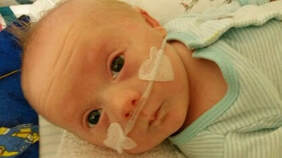
Oliver came into the world full of surprises! He arrived 5 weeks early (the day we moved into our new house none the less!) with a previously undetected diagnosis of Down syndrome and an atrioventricular septal defect (AVSD) in his heart. Both were diagnosed at 3 days old, despite having prior negative screening tests and ultrasounds. We spent 8 weeks in the NICU in order to understand what was going on with our little man and were finally discharged home on oxygen- only to return at 5.5 months for open-heart surgery.
We spent 5 weeks at sick kids for his surgery in 2016 after a surgical complication called Chylothorax. He has been home since with no other admissions since despite our regular clinic checkup dates.
We spent 5 weeks at sick kids for his surgery in 2016 after a surgical complication called Chylothorax. He has been home since with no other admissions since despite our regular clinic checkup dates.
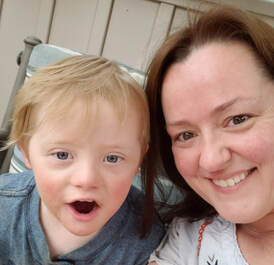
The hardest aspect of my journey was the guilt. You need to be able to take care of yourself to stay fighting for your child but every minute you are away from your child’s side is agony. You spend 9 months imagining this happy little life when you bring your newborn home only to have the reality shatter it all- I did not come home with my newborn until 2 months later. No one could visit, no baby shower, no Mom and baby groups. I felt sorry for myself- and then you feel guilty because you should be over the moon that he is ok- there is always an it could be worse situation.
The hardest thing about your transition home was was when we first came home from the NICU Oliver was on oxygen so it was a huge adjustment to have oxygen tanks in our house- making sure he kept it on his nose, Also we had to live in a bubble to make sure he didn’t get sick until his heart surgery. It was very difficult to manage both my own and everyone else’s expectations of what life with a newborn should be like vs the reality.
Advice I would give to NICU parents is say feel your feelings. It is ok to be mad, to feel sad, to feel guilty- to want it to be different. Feeling your feelings is part of taking care of yourself. The staff are there to help you- its ok to rest and take care of yourself.
The hardest thing about your transition home was was when we first came home from the NICU Oliver was on oxygen so it was a huge adjustment to have oxygen tanks in our house- making sure he kept it on his nose, Also we had to live in a bubble to make sure he didn’t get sick until his heart surgery. It was very difficult to manage both my own and everyone else’s expectations of what life with a newborn should be like vs the reality.
Advice I would give to NICU parents is say feel your feelings. It is ok to be mad, to feel sad, to feel guilty- to want it to be different. Feeling your feelings is part of taking care of yourself. The staff are there to help you- its ok to rest and take care of yourself.
Matilda'S Story by mama Jessica
•••Credit Vally Hospital - mississauga, ON
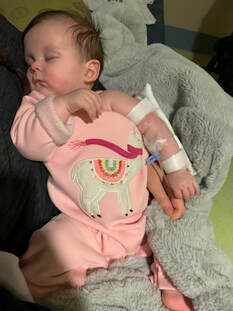
Our daughter Matilda is extremely susceptible to urinary tract infections (likely stemming form shorter ureters at birth) possibly vesicoureteral reflux (VUR). This means that some urine flows back to the kidneys increasing the chances of a UTI regardless of what we do. We are still waiting on her proper diagnosis. When she was 4 months old, she suddenly came down with an 104 fever, extremely lethargic, rapid heart rate, and fast breathing. Even though I had seen many fevers from illness with my older daughter, I knew this was different. After getting her into emergency, doctors and nurses ran every test imaginable to find the source of infection. It took about 8 hours before she was hooked up to broad spectrum antibiotics, and we had to wait another 6 to get into a hospital room. Her stay was 3 nights long. The doctors assured us after checking her kidneys that it was likely a one-off, and if it happened again to see a specialist. It happened again...while on a family trip to Disney two months later. Her specialist appointments have been pushed back due to Covid but we’re hoping to know more in November when we see a urologist.
My husband and I both agree that the hardest part of our journey was being separated from one another. Having a 2 year old at home, my husband stayed with her and I stayed with the baby. The girls were so happy to be reunited when it was all over. We kept thinking of other parents and siblings that have to go through this for much longer periods of time.
The hardest thing for my husband was being scared that it would happen again. Every diaper change, how much fluid she drank, bath time, playing outside in bathing suits...we questioned our every move. Not knowing her full diagnosis yet has been difficult for me. I cope by reading as much information as I can so that I’m prepared mentally. I’ll feel better when she is seen by a specialist.
As I’ve never had a NICU baby I’m not entirely sure on specific advice. For having a baby in an emergency or in hospital my advice is to learn as much as you can, and be your child’s advocate. You know best when something is wrong even if a health professional thinks it’s nothing to worry about. You know your child, go with your instincts.
My husband and I both agree that the hardest part of our journey was being separated from one another. Having a 2 year old at home, my husband stayed with her and I stayed with the baby. The girls were so happy to be reunited when it was all over. We kept thinking of other parents and siblings that have to go through this for much longer periods of time.
The hardest thing for my husband was being scared that it would happen again. Every diaper change, how much fluid she drank, bath time, playing outside in bathing suits...we questioned our every move. Not knowing her full diagnosis yet has been difficult for me. I cope by reading as much information as I can so that I’m prepared mentally. I’ll feel better when she is seen by a specialist.
As I’ve never had a NICU baby I’m not entirely sure on specific advice. For having a baby in an emergency or in hospital my advice is to learn as much as you can, and be your child’s advocate. You know best when something is wrong even if a health professional thinks it’s nothing to worry about. You know your child, go with your instincts.
